
Exposé Online
What's old
Exposé print issues (1993-2011)
- 1 (October 1993)
- 2 (February 1994)
- 3 (May 1994)
- 4 (August 1994)
- 5 (October 1994)
- 6 (March 1995)
- 7 (July 1995)
- 8 (November 1995)
- 9 (March 1996)
- 10 (August 1996)
- 11 (February 1997)
- 12 (May 1997)
- 13 (October 1997)
- 14 (February 1998)
- 15 (July 1998)
- 16 (January 1999)
- 17 (April 1999)
- 18 (November 1999)
- 19 (May 2000)
- 20 (October 2000)
- 21 (March 2001)
- 22 (July 2001)
- 23 (December 2001)
- 24 (April 2002)
- 25 (September 2002)
- 26 (February 2003)
- 27 (August 2003)
- 28 (December 2003)
- 29 (April 2004)
- 30 (September 2004)
- 31 (March 2005)
- 32 (September 2005)
- 33 (May 2006)
- 34 (March 2007)
- 35 (January 2008)
- 36 (October 2008)
- 37 (July 2009)
- 38 (July 2010)
- 39 (Summer 2011)
Features
Trying on New Threads —
The Doane Perry Interview

We spoke with Doane Perry, drummer for Jethro Tull, about his new project called Thread backstage at the Concord Pavilion, prior to their gig that night with ELP. We'd like to thank the following people for their involvement in setting up the interview: Mark Cella from M&M Music, and Kenny Wiley, Tull's tour manager.
by Jeff Melton, Paul Hightower, Published 1997-05-01
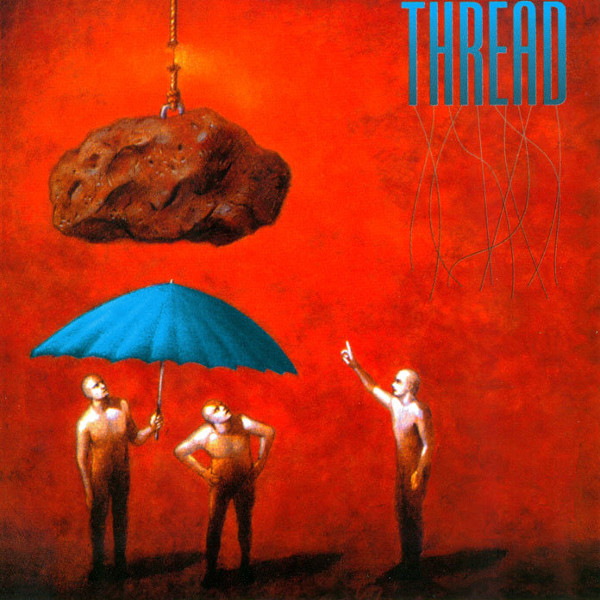 How did the Thread project come about? How did you hook up with Vince DiCola (keyboardist for Thread)?
How did the Thread project come about? How did you hook up with Vince DiCola (keyboardist for Thread)?
Vince and I have kind of a long and windy history. Vince and I go back to about 1982. He had actually called me to play on a record with one of the great progressive artists of all time: Frank Stallone! With all credit to Frank, it was actually a very good record. It was kind of a bit like Gino Vanelli. Vince was writing and producing with Frank. Vince had just done Rocky IV and worked on Staying Alive.
...the Travolta movie?
Yeah. Anyway, he had called me to play on Frank's album. Vince and I seemed to always hit it off musically and have an interest in more esoteric music. We started playing together... none of the stuff you've heard with Thread, some other things with a trio project back in '84. Then I joined Tull, years passed and we just weren't hooking up — I was always on the road doing something. Then at a certain time, Vince and I decided we were going to try to launch this project as a writing outlet for both of us. But it wasn't Thread. It is a completely separate project which is actually coming out next month in Europe called Storming Heaven. You probably haven't heard anything about it.
No...
Storming Heaven was initially Vince and I, then we found this singer from Canada named Rick Livingstone. And we wrote with Rick.
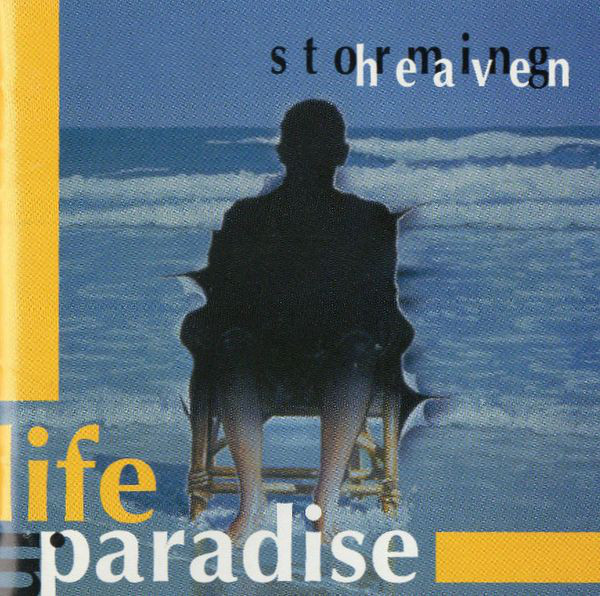 He's a solo artist?
He's a solo artist?
Well, He did a tour as the singer with this group... Keith Emerson, John Entwhistle, and Jeff Baxter; Simon Phillips and Joe Walsh, too.
Oh... The Best. They did a Japanese tour. They went overseas and played for some American troops.
Yeah, did a tour with this band. He was the lead singer with that and was very good at it. We hit it off writing-wise, then that group grew to include Curt Taylor on guitar and Casey Young (a synth player and programmer Vince had worked with). And we wrote a lot of music and made a record. Then Vince and I had been writing some material and had wanted to do some work not necessarily that different, but appropriate for Storming Heaven. We played them some of the things we were thinking about. The other guys were all sort of shaking their heads saying, "I don't know about that. Well, I don't get that." So we felt then, rather than crowbar that material into Storming Heaven, we thought it would be better to separate the projects entirely. So Vince and I decided we would start this other project that became Thread. Otherwise it would have all come out under the banner of Storming Heaven. It's coming out next month in Germany on Major MTM records.
We'll have to pick that up!
You can actually hear the connection in the playing and the writing as well as a production connection. I would say that Thread is different in many respects though. But there is probably enough similarities so they could be seen if not as a pair of twins, but as a pair of siblings, separated by a few years. So Thread became a more personal project for both Vince and I; we had gone through several singers.
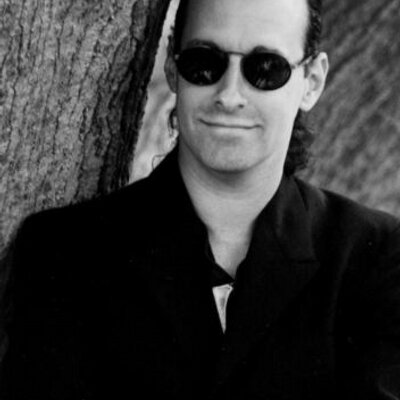 How did it work out?
How did it work out?
See, it's kind of a convoluted history, but Steve Walsh from Kansas had come out, and he worked with Vince and I before Storming Heaven. That was on some material we were looking at with a view toward it being Thread material. Then Steve, just because of the geography — he lives near Atlanta, we lived in California — he'd come out and record, then he'd be gone. Then Steve decided at one point he didn't want to be a singer anymore, he wanted to produce records and so he was really taking some time off. Then he decided he wanted to be a singer again and rejoined Kansas. By that time we had moved on, and we had tried some other singers, but nothing that really quite gelled. And then we found Ellis Hall. Now, I had known about Ellis because a friend of mine had played with Tower of Power when Ellis was the lead singer. Ellis also sang on some George Duke records. He came from that area of music which is related but quite different. I thought, gosh this is going to be interesting 'cause this is not the kind of voice you would expect to hear singing this kind of music. And that's why I think this kind of marriage works — because it is a different sort of approach. Ellis said to Vince, "Look, just don't peg me as an R&B singer. I really love your material, I'd really like a crack at singing it.” He sang and Vince and I said, "Hey! This is the guy, isn't it?" We gave him a tape of Live at the Scene, and another one. We went over to his house, and he had put some stuff down on an ADAT. He played it back for us and the hairs on the backs of our necks stood up after hearing it. "God, this is fantastic!" Ellis really had the right feel for it. He's been a real integral part of it now as a singer. We look forward to, on the next record, writing with Ellis and seeing how that works out because Vince and I wrote with Rick Livingstone originally.
Well, you do have the two projects going in parallel...
Thread is actually out before Storming Heaven, but we finished Storming Heaven long before Thread! But I think Martin (Barre, Tull's guitarist) has probably told you we're looking at doing this joint tour together next year. Martin with play with Thread and Thread will play with Martin. It'll be like this old-style package tour.
He has a very soulful approach and brings up a really strong lead where he re-enforces the melody.
He's an extraordinary guitarist, and he has a very individual style. I think it will really work in the context of playing with Thread. I think that's going to be very interesting.
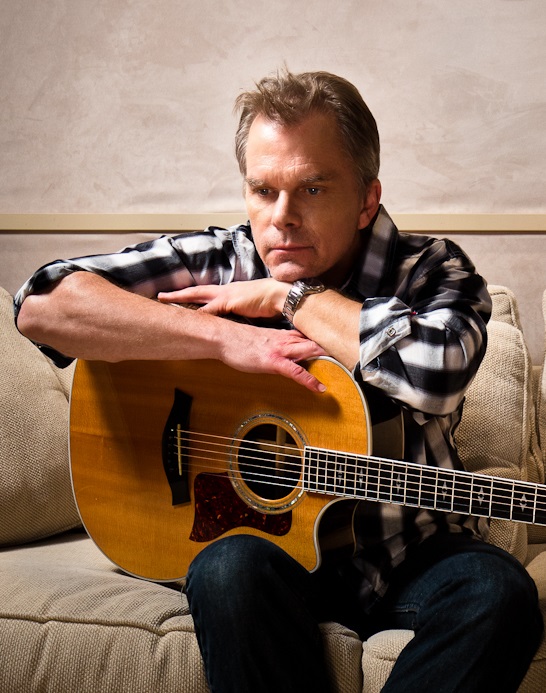 You have a lot of different session players on the disc, too. It doesn't seem to mean that you're navigating around figuring out who's doing what. That is, if you're listening for that guitar thing.
You have a lot of different session players on the disc, too. It doesn't seem to mean that you're navigating around figuring out who's doing what. That is, if you're listening for that guitar thing.
Well, there's some great guitar playing on the record. It was 'cause we hadn't settled on a guitar player and a guitar player hadn't settled on us! It was finding somebody who felt like... I mean both Rocket Ritchotte and John De Faria. John and I met and had done a tour with Kitaro and Jon Anderson. I loved his rhythm playing. Rocket I had known for a while as well. I'm sure we would have put Martin on the album if he hadn't been so far away. You know Thread started out as Vince and myself and now it has become Vince and Ellis and myself. If a guitar player wanted to do it full- time, as it is right now sandwiched in between Tull commitments, that would be great. But we're doing it as quite a serious project to us. There is a lot of our time and a lot of ourselves that really went into it.
This is not just a side project, it 's something that you'll be able to go ahead and follow up on.
Well, for the same reason Martin is doing his thing. In the context of Jethro Tull, Ian is the songwriter of the band. We all interpret those songs and it's very much a group in the way it is arranged and how we interpret it. He's got so much fantastic material and he's such a gifted songwriter that if any of us said, "Well, each of us wants two songs on the record!" that would never work. The band has been built for all these years on Ian's songwriting, and so it should be. Tull's an incredible platform for his songwriting. I think it would be unfair to the Tull fans if there was suddenly less of that personal input of Ian's. But it's very healthy for all of us to have an outlet for writing. For me, it's taken different forms over the years. I think that's healthy 'cause when I go back to Tull, I can play with that renewed vigor. I really enjoy that. It's not as if I'm trying to foist off some music on the band or Martin either. The problem is that there is even more material to put on the record that just Ian comes up with, let alone anyone else contributing one song.
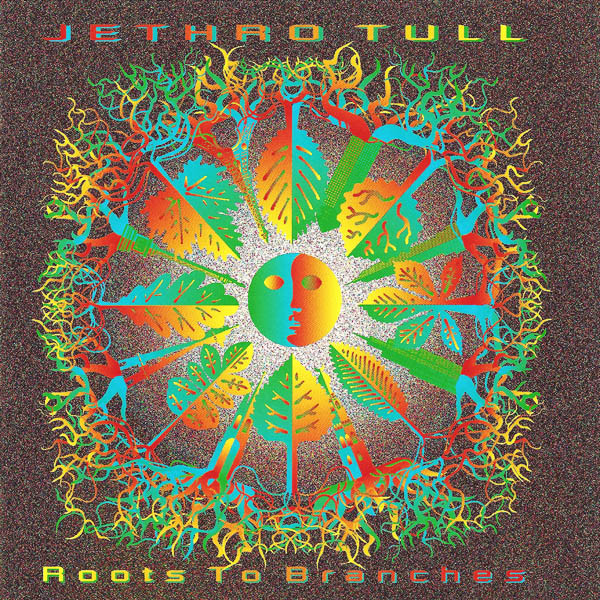 There are a lot of good Tull outtakes. There's been so much of that coming out on the boxed sets.
There are a lot of good Tull outtakes. There's been so much of that coming out on the boxed sets.
We got some great outtakes from Roots to Branches that nobody's heard yet, and one day maybe some of those will surface. So fair enough. If you accept the terms of that, then I don't have a problem with that. I love playing Ian's music every night when I go on stage, and it's us as a band. That's why every incarnation of Jethro Tull comes across as the identity of the individual members of the band. You're still hearing Ian's music coming out interpreted in different ways, through different filtering systems, if you like.
Tell us about the new bass player in Tull, Jonathan Noyce. How is the new rhythm section working?
That's been working out very well. Jon and I first met on the Divinities tour. And it's funny since he was playing upright bass — which he hadn't played in some years very much — and I was playing electronic percussion and tuned percussion. I only played drum set on four songs in that whole show. So playing as a standard rhythm section, we were both playing what wouldn't be considered our main instruments. It was really fun and we get along great together. Then, because Dave (Pegg) had decided that he just needed to take some time back from the band because the schedules for Fairport and Tull had been increasingly more conflicting over the years, Dave felt there was some stress there due to juggling things with the amount of work between the two bands. I think he was afraid that it was going to be too much for him, and that's understandable. I think it was a healthy thing for him to do. I don't know what the future will hold.
We've all talked to Dave. Dave has seemed to be happy and he's enjoying himself. We love Dave and nobody wanted to see him be unhappy or stressed about the workload and be worrying about not giving Fairport the time they needed, and then, consequently, not feeling like he was going to enjoy the Tull tour. Then you don't enjoy anything — you're working too hard to do two things and neither one of them become pleasurable. If Dave feels like he needs to take a little more time away from things so he can enjoy his life... Dave's a very hard worker. He and his wife Chris organize the Cropedy festival — that in itself is just an enormous event. There are no bad feelings about Dave! I'm telling you that as a member of the band.
Tull fans just have liked Dave for a long time, so it's just nice to know that the door is still open. Back to some of the stuff on your album, there are some pretty strong songs. Not just lyrically, but the arrangements are Emersonesque (for lack of a better word). Obviously the album is influenced by Keith Emerson as a symbol of keyboard virtuosity.
You know it's funny you should say that since I don't really hear that at all. Somebody else said, "Oh, there's definitely some ELP in there." I really can't hear that in it. I mean ELP are such a strongly identifiable thing. I hope that whatever identity we have will be our own and not seen through any other band. I think inevitably you start off getting compared to some band, then suddenly people go, "That sounds like Thread." You're going to get some comparisons to that. Keith has been some influence on Vince, but Vince plays his own way. There is his own style and playing which comes out in a very broad sense. Because the music is keyboard based, people will make this attachment to anything like ELP.
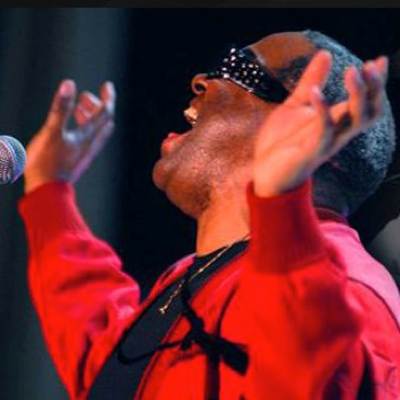 It seems like a simple comparison, but Thread does deviate in a lot of different ways. In particular, vocally it's got a bluesier feel overall than any ELP project.
It seems like a simple comparison, but Thread does deviate in a lot of different ways. In particular, vocally it's got a bluesier feel overall than any ELP project.
Certain American influences would be there in Thread music. There are some European influences that are there, too, along with R&B, African, jazz, orchestral, and rock and roll. It's hard for me to hear that since I'm inside of it.
You did some of the writing on the album. Do you write at the keyboard and come up with some things with Vince? How does that work?
Keyboards were actually my first instrument before drums. I played that for three years. I'd say I'm a functional keyboard player. This album was divided up between myself doing most of the lyrics and Vince doing most of the music. And Rick Livingstone contributing a little bit of both to a few songs. And there is a crossover where we do some of the other. On the next album, I'm expecting it's going to be more evenly spread out. It depends on what Ellis brings to it. It's a cooperative process. Vince had a lot of music and said "What can you do with that?" We've never drawn a line about who does what. There will be much more of that on the next album.
Is that the symbolic-type representation of the project then?
You mean in the name?
Yeah, well, you know, the cover is this umbrella over a rock. And I'm thinking, "Is this trying to tell me something?" The name reflects different elements trying to find a way to interconnect.
The picture came about in that kind of way. We were looking through this book from the Image Bank and it has some humor in it. It wasn't too pontificating about some point, it wasn't some heavy image. And it was perfect! We didn't paint that. The name — yeah, there's a thread through all the music. It's a very eclectic blend. I didn't want it to be a heavy name. To get back to the writing, there's been a lot of stuff I've been stockpiling with vocal melodies. I'm going to give it to Vince when I get back from the tour. He's had some ideas about some thematic things. I have a book that I keep of things that have great titles or lyrical snippets. Sometimes that, along with the title, I'll come up with a phrase or put two phrases together and expound on that.
So you're dealing with a lot of little bits and trying to be able to find a way to fit them together.
I've been working with Vince intensely. After a while you forget who did what things. If you get to the end and listen back and can say, "That's really good," that's the main thing. There may be a time when I do something on my own in my own studio. But that may end up being more esoteric than Thread.
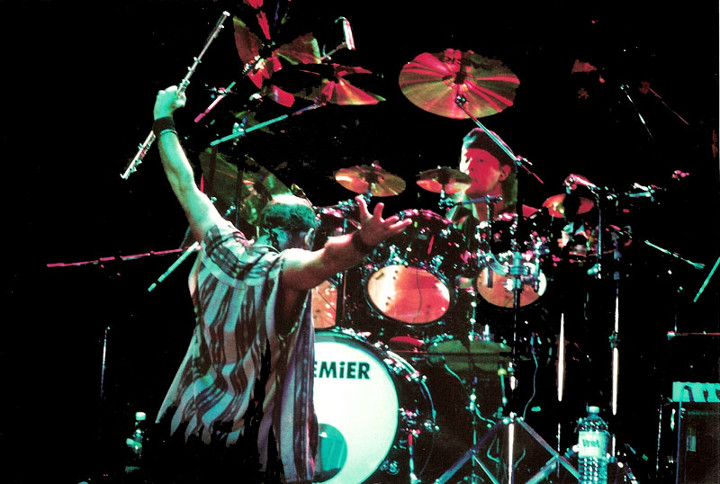 Thread has an identity which is immediately recognizable. It doesn't sound like a one-off. It looks like there has been some real thought put into it. It looks like it can go forward, too.
Thread has an identity which is immediately recognizable. It doesn't sound like a one-off. It looks like there has been some real thought put into it. It looks like it can go forward, too.
I'm really glad that comes across because it's not taken lightly. Some people asked me, "Does this mean you're leaving Jethro Tull?" I hope these things can coexist together, but I think it is important for my growth and my health as a musician to have an outlet for my writing and it gives me that renewed vigor. For years I played on loads of people's records and toured with lots of people. It gets to be that you want to be your own creating force. Thread is more an individual project for what I want to be doing as a musician at this point. Also, my playing in Jethro Tull is a very accurate description of how I play as a drummer. We're all allowed to play the way we want in Tull. In Thread, it goes beyond that since you're also building the music from the ground up. I don't think Ian looks at it as a threat. I think we all realize it's a very good thing to do something outside of the band. We're not working every moment of the year. It's been hard on working out time with Vince. I have been away for long periods of time, then I come back and we try to put some things together. Also, I'm working with some other people at home, too, whether it's recording or going out on the road with Kitaro and Jon Anderson. That was really fun. I really enjoyed it. That was very orchestral material including the Kitaro and Yes material.
 I agree — doing a larger semi-symphonic piece.
I agree — doing a larger semi-symphonic piece.
It was kind like of like doing an orchestral Pink Floyd. When we went to Japan, the staging was really dramatic. People unfairly lump him (Kitaro) into the new age category. It's not the stuff you sit down and listen to while you have your chamomile tea. It's not background music for dinner.
What's the deal with this Laughing Gull Records? Is that from L.A.?
That's our label. It is better to put it out yourself and you might limit control that you're giving up. When you have to give it to a label and they say, "Here's the terms, take it or leave it," we don't have to do that. We don't have to go through censorship committees. Or lack of control once you give it to someone else. If we got a proper deal with a major record company we would probably do that. We would get much better distribution, much like in the way Fairport reclaimed their catalogue and then they released stuff on Woodworm. What you learn from doing that -- having control of the artwork, control of the mastering of the CD, all of those things I'm glad we learned about first-hand. There's a lot of things you can really do on your own now. If you have a record company and they really like your music, they might want you to put on these silver suits and play in Tahoe. Forget it. I've seen a lot of those kind of things. It's important to get it out in time for the Tull tour, too. We expect it will get picked up by a major distributor in America and Japan. It's a little more complicated, but it can be better financially in the end.
You don't mind dealing with that (business) part of it?
I like that part of it. I mind the hours sometimes it requires. I've always had a good head for business. I've learned a lot from being in Jethro Tull. Ian's a fantastic businessman and very savvy. Ian is now and has been the manager of Tull for some time. He's got his interests and the band's interests at heart. He knows what it takes to get the band on the road to promote an album. He's also very fair with all the people that work for and with him over the years. I think that's why the band has had the longevity that it's had. That goes right through the organization. Ian sets a good example for the band. It really stands for something, for someone to have a set of moral and ethical standards, not mention artistic standards. You should be that way as a person and also as a professional. You should know what's going on with your, money. I think it's good that musicians know how it works. It didn't used to be that way at all.
That's becoming a lot more evident to artists now. There is one piece on the album called "Hand of Kindness." That's part of a bigger song, right?
That was long piece of music with a story — fifteen-minute piece. It's five minutes now. It took some editing and I've never been completely happy with it in the short form. That's why we decided we would probably put it out in the long form on the next disc. I've actually been playing the whole thing at drum clinics. We just wanted it to be a little shorter for the purposes of this record. I know if we had two fifteen pieces on a record some people would think that was too long.
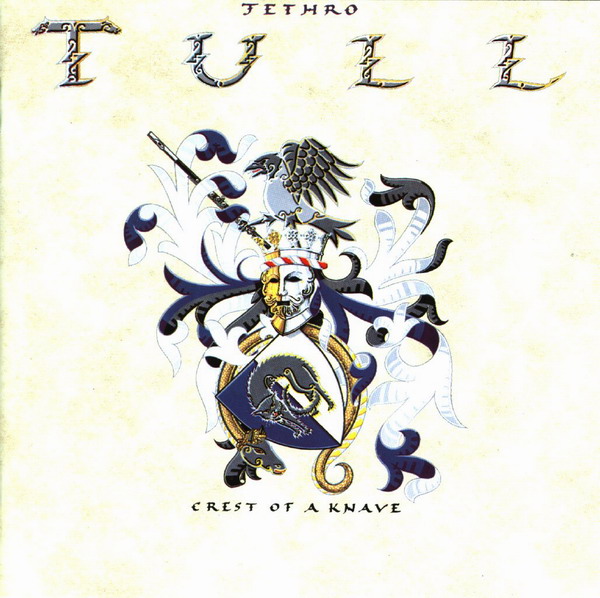 That's hogwash!
That's hogwash!
We felt that might be too much on the first time out. Unfortunately, it's a bit like reading from the middle of a book because part of the story has been truncated. There is a shortened story as part of a compromise.
It looks like there has been an attempt to sequence the disc going from power ballads to stronger songs at the end of the discs. "Rage" is also a pretty aggressive stand-out track, too.
Well, you're right. The sequencing is very critical. You want to make it track by track to see that it segues well. You want people to feel like they've gone on a journey from beginning to end.
I think your audience is going to go from beginning to end and then come back and check out a track they liked. Sometimes you can put a disc on shuffle mode and it comes back playing in an interesting order.
I never do that (use CD shuffle mode). "Another Mean Day" was written from the view of social commentary. Certainly there was some personal commentary on, say, a social issue. That started off as a tirade against television. "Just Out of Reach" was written from the point of view of emigrating to a new country, not necessarily America, but that transition that the Eastern European countries underwent when the Berlin wall came down was remarkable.
I've been to East Berlin. When the wall went up, the East side aged and the West continued to be modernized, so you got that really bleak industrial buildings sort of thing. It was kind of like the East was frozen in time.
Well, we saw a dramatic change — we went back a few years later and then it was amazing how things had really changed. "Just out of Reach" came from a day in the city of Rostock. More like the before and after scenario.
Is there anything else you'd like to say about Thread?
It is a work in progress. That's the best way I can put it. It is the first step doing that sort of thing. I hope that outlet will be meaningful to people — I don't want people to worry about, now that two people have solo albums, that's the end of Tull. In a way, they kind of feed each other. I've played drums all my life, but that's not all I want to be remembered for. Some of my favorite music has no drums on it whatsoever. There's a real deep sense of satisfaction when you've written something you feel good about as a composer. It's interesting to go back and listen to a piece of music a year later and say, I like that or hate that. But you have to acknowledge that as a reflection of where you were at during that time. It goes beyond just being a drummer and into the realm of music as a totality.
Filed under: Interviews, Issue 12
Related artist(s): Ian Anderson, Jethro Tull, Martin Barre, Thread
What's new
These are the most recent changes made to artists, releases, and articles.
- Review: Sterbus - Black and Gold
Published 2026-03-03 - Release: Janel Leppin's Ensemble Volcanic Ash - Pluto in Aquarius
Updated 2026-03-02 15:06:51 - Release: Janel Leppin - Slowly Melting
Updated 2026-03-02 15:05:27 - Release: Alister Spence - Always Ever
Updated 2026-03-02 15:04:11 - Release: Let Spin - I Am Alien
Updated 2026-03-02 15:02:41 - Review: Falter Bramnk - Vinyland Odyssee
Published 2026-03-02 - Review: Exit - Dove Va la Tua Strada?
Published 2026-03-01 - Review: Steve Tibbetts - Close
Published 2026-02-28 - Release: We Stood Like Kings - Pinocchio
Updated 2026-02-27 19:24:02 - Release: Stephen Grew - Pianoply
Updated 2026-02-27 19:20:11 - Release: Thierry Zaboitzeff - Artefacts
Updated 2026-02-27 00:16:46 - Review: Kevin Kastning - Codex I & Codex II
Published 2026-02-27 - Release: Zan Zone - The Rock Is Still Rollin'
Updated 2026-02-26 23:26:09 - Release: The Leemoo Gang - A Family Business
Updated 2026-02-26 23:07:29 - Release: Ciolkowska - Bomba Nastoyashchego
Updated 2026-02-26 13:08:55 - Review: Immensity Crumb - Chamber Music for Sleeping Giants
Published 2026-02-26 - Release: The Gatekeepers - Diary of a Teenage Prophet
Updated 2026-02-25 15:55:58 - Listen and discover: Mordecai Smyth will not break your back
Published 2026-02-25 - Review: Mars Lasar - Grand Canyon
Published 2026-02-25
